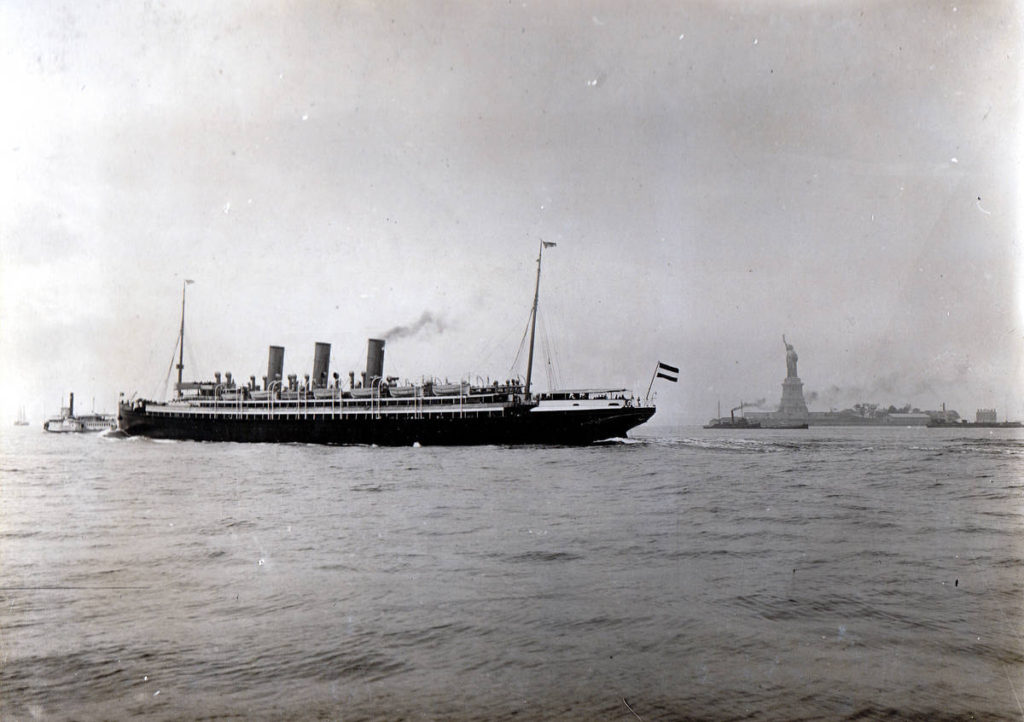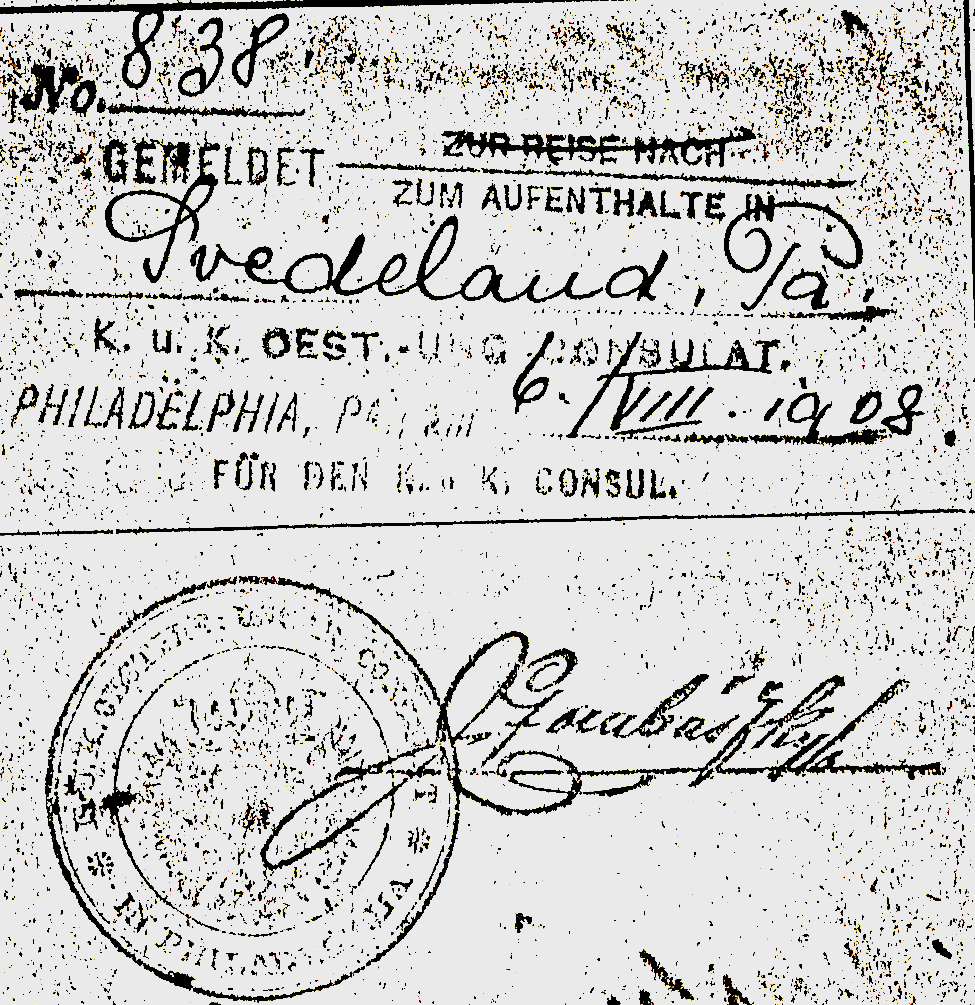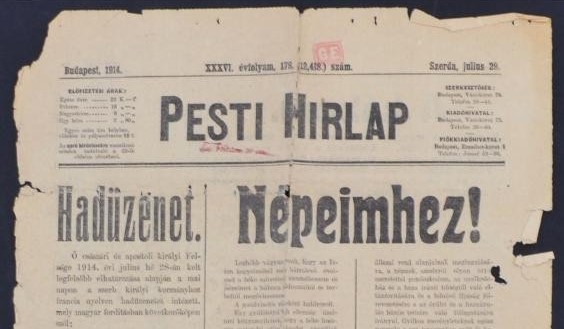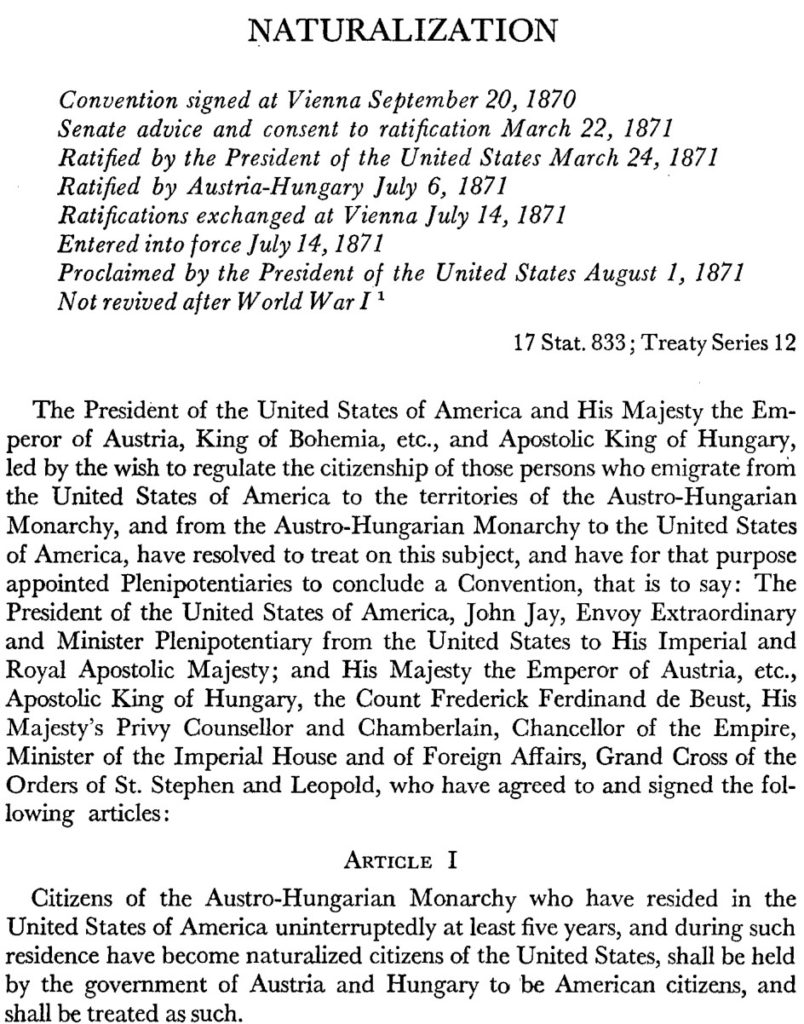DISCLAIMER:
This article originally claimed that 1904 was the decisive year because wartime suspended the application of certain rules pertaining to citizenship. This interpretation has been rejected by Slovak authorities.
Other information regarding loss of citizenship after a 10-years’ absence and the concept of the right of residence remains undisputed.
TLDR: People from Slovakia became citizens of Czechoslovakia in 1920 regardless of where in the world they were physically. In order for that to have happened, they had to have had the “right of residence” within a municipality that became Czechoslovakia and in order to possess that right, they had to have been citizens of the Kingdom of Hungary. Being absent from the Kingdom for longer than 10 years led to loss of citizenship. Assuming that wartime suspended the application of the 10-years’ rule (which is currently disputed by Slovak authorities), since WWI broke out in July 1914, the vast majority of people who had emigrated before July 1904(ie. spent more than 10 years abroad before war broke out) lost their citizenship, hence also lost their “right of residence”, hence couldn’t become a Czechoslovak citizen. There are certain exemptions discussed below. [is this the longest TLDR ever? 😅]

The Long Version
Kingdom of Hungary and the Right of Residence
The Kingdom of Hungary (as a semi-sovereign part of the Austro-Hungarian Empire) had a concept called the “right of residence” [községi illetőség, more literally “municipal jurisdiction”]. This is something that is akin to the concept of permanent residence, but is really more like a municipal citizenship – one would get it from their parents, regardless of where he or she resided and a process that looked almost like modern-day naturalization was required to change this “right of residence” to a different municipality. This right entitled the person to social care in the municipality to which they belonged and they could even be deported to that municipality, if an another municipality deemed them a nuisance (it was a handy way for big cities to kick out beggars). The concept was codified in Hungary in 1871.
How do we determine who is a Czechoslovak citizen?

After Czechoslovakia was founded, legislators were faced with a problem: How do we determine who is a citizen? The territory was a mess when it came to ethnicities and migration. One might think they could’ve just used jus soli, ie. consider everyone born in what became Czechoslovakia a citizen. But what if someone was the child of the much hated Austrian or Hungarian bureaucrats, who had previously persecuted the aspiring nationalists while being posted in Czechia or Slovakia? What if a Czech or a Slovak was born outside of Czechoslovakia, while their father was serving in the military or held a government job in Vienna or Krakow back when it was all one country? What if Czechoslovakia decided to treat its German or Hungarian speaking minorities unfairly?
So, when the founders of Czechoslovakia created the law (a constitutional amendment), which determined who was a citizen of the new nation, they needed something to establish who “truly” belonged to the territory. Using the concept of the right of residence was an obvious choice. In fact, it was the agreed method established in WW1 peace treaties. Thus, when Section 1 of the Constitutional Amendment was passed in 1920 (and I beg my constitutional law professors to forgive me for using this extremely inaccurate term), it stipulated, among other things, that all those who have continuously held the right of residence on Czechoslovak territory since at least 1910 were to be considered citizens.
Why was the act only passed in 1920 if Czechoslovakia had been founded in 1918 and even the act itself is effective from 1918? The answer is simple – the Prague government did not control Slovakia until 1920, when the Treaty of Trianon was finally signed. When faced with this problem, legislators opted for the law to work retroactively from 1918, despite being passed in 1920.
§1 Czechoslovak citizens are:
1. Effective October 28, 1918, persons who, at the latest on January 1, 1910 acquired and have since continuously held the right of residence in the territory of the former Austro-Hungarian Empire, which now belongs to the Czechoslovak Republic.
Constitutional Act no. 236/1920 Coll., on State Citizenship and the Right of Residence
Back in the USSR Kingdom of Hungary
Now in order to understand the essence of the 1904 rule, one must also understand the dynamic between the right of residence and citizenship. The former concept, as it was conceived in the Kingdom of Hungary back in 1886, was inherently tied to that of (state-level) citizenship – the law stipulated that every Hungarian citizen had to belong to a municipality. Hence, it is also implicit that one could not have held this privilege of the right of residence (and therefore the entitlement to social care of the state/municipality) without also being a citizen of the Kingdom of Hungary, which is something that the Czechoslovak Supreme Court later affirmed (Rv II 354/28). One could argue it was in a way a subsystem of the “main” Kingdom-level citizenship.
§ 6
Every citizen must belong to a municipality.
Act XVIII of 1871 on the Administration of Municipalities

The Imperial and Royal Austro-Hungarian Consulate in Philadelphia”
Example of a Slovak emigrant reporting their stay in 1908
If one had to have been a Hungarian citizen in order to have retained their right of residence, then we must look at what affected someone’s Hungarian citizenship in the first place. The Kingdom passed its first ever (and inadvertently also last ever) codified Citizenship Act in 1879. This law established who was a Hungarian citizen, how citizenship could have been acquired or relinquished and most importantly for the topic of this blog – how absence affected one’s Hungarian citizenship.
The law stipulated in its now infamous Section 31 that an uninterrupted absence of over 10 years from the Kingdom meant automatic loss of Hungarian citizenship. This loss extended not only to the person involved, but if they were a male, also to his wife (given they lived together) and his minor children.
One could take certain actions in order to prevent this from happening, such as getting a new passport abroad, reporting their stay to a consulate or letting their home municipality know they were still interested in keeping their citizenship. Obviously, setting foot on Hungarian soil would also interrupt this dreaded clock. Another implicit factor, which would interrupt this period, was war.
§ 31. Absence.
A Hungarian citizen who resides outside the territory of the Hungarian Crown for 10 years without interruption and without the assignment of the Hungarian government or the Austrian Hungarian common ministers, loses his or her Hungarian citizenship.
The period of absence shall be counted from the day on which the person left the territory of the Hungarian Crown without notifying the competent authority specified in Section 9 of the maintenance of his Hungarian citizenship; or if he/she left with a passport, from the day on which the passport expired.
Continuity of absence is interrupted by notifying the above-mentioned competent authority of the retention of Hungarian citizenship, or by obtaining another passport, or by obtaining a residence permit from an Austro-Hungarian consular office, or by being entered in the register of an Austro-Hungarian consular office.§ 32. The loss of Hungarian citizenship in this way extends to the cohabitating wife of the absent man and to the minor children under his paternal authority.
Act L of 1879 on the Acquisition and Loss of Hungarian State Citizenship
World War I
DISCLAIMER:
This interpretation has been rejected by Slovak authorities.
On 28 June 1914, Archduke Franz Ferdinand, the heir of the Austro-Hungarian Empire was assassinated in Sarajevo, Bosnia. This lead to an ultimatum, which ran out on 28 July 1914 and the monarchy declared war on Serbia, starting World War I and a state of war within the constituent Kingdom of Hungary. As mentioned previously, war was a factor, which implicitly interrupted the usual legal processes, including that of the 10 year absence period under the Citizenship Act of 1879. Thus, if we count back 10 years from 28 July 1914, we get the ultimate deadline of 28 July 1904. Therefore, no one who left on or after 29 July 1904 could ever lose their Hungarian citizenship by virtue of being absent, as the 10 year period couldn’t elapse without being interrupted by the state of war in 1914.

So 1904 is the decisive year, right?
DISCLAIMER:
This interpretation has been rejected by Slovak authorities.
Yes and no. It’s indeed possible that someone emigrated before 1904, yet retained their Hungarian citizenship and thus became a Czechoslovak citizen, but it’s also possible that someone, who had emigrated after 1904 inadvertently lost their Hungarian citizenship.
The discussion within this post is mostly limited to the institute of loss of citizenship due to absence, however there are other ways, in which one could lose their citizenship, as well as ways for emigrants to preserve their citizenship (some of which were already mentioned). Nevertheless, it’s important to realize that in order to comprehensively cover the nuances, one must have a good understanding of 18th and 19th century Hungarian jurisprudence. In this post, I have only relied on Norbert Varga, PhD., who is an assistant professor of the Hungarian Legal History Department at the University of Szeged’s Faculty of Law, whose academic articles (1, 2) are the only English language sources I could find on this topic. As a very complex and nuanced issue, it is possible that other academics may holder different opinions and it’s very difficult to cross reference Dr. Varga’s work with the jurisprudence from that time.
Despite the difficulty of interpretation, when it comes to legislation and legal doctrines this old, I will attempt to introduce certain ways, in which citizenship could have been lost or preserved, regardless of the 1904 deadline (in addition to the methods mentioned already).
Ways in which one could preserve their citizenship
Dodging the draft
Male Hungarian citizens would join the military from the ages of 17 (voluntarily) and 20 (mandatorily). There were certain exemptions, which are nevertheless too complex to delve into. The most significant issue with showing that an ancestor held on to their citizenship (and thus later became a Czechoslovak citizen) is the fact that many military records have been lost/destroyed and so it’s oftentimes almost impossible to say with certainty, whether an ancestor had served in the Austro-Hungarian military. Because it is an exception to the rule, the burden of proof is on the person claiming their ancestor didn’t serve.
Being a minor
Because minors did not have legal capacity to act, they could not lose their citizenship by reason of absence. It’s nevertheless unclear, when the absence period would start to be counted – the most likely answer is the moment they reached the age of majority, ie. 24 years of age.
Having a child that reached military age
This encompassed the time between that child’s 17th year of age and 24th birthday, ie. the child would have been eligible (or required) to serve, yet their father’s loss of citizenship would have prevented them from doing so. After the 24th birthday, the child was considered an adult, who was no longer under their father’s paternal authority, yet was still required to serve. It therefore seems logical that it is from that moment that the father’s 10-years’ clock had started, while the child was still covered by the “draft dodger” exemption.
Receiving benefits from the state
No one who received any pensions or similar benefits could lose their citizenship.
Women who resided separately from their husbands
It is clear that women, who did not live with their husband when he lost his citizenship were unaffected, but it remains unclear what happened when such a woman joined her husband abroad after he had lost his citizenship. One could argue either that since the “loss event” happened in the past, while the wife was unaffected, it couldn’t affect her retroactively. At the same time, one could also argue that this wife’s “loss of citizenship” was suspended and took place once the wife joined her husband abroad.
Ways in which one would lose their citizenship regardless of when they emigrated

Women, who married non-citizens
The most common way for women to lose their citizenship was by marriage to a non-citizen. One must understand that in most places at the time, women’s citizenship was connected to their husbands’ status and women would often gain citizenship by marriage, as was the case in Hungary. It was therefore assumed that women would acquire a foreign citizenship and thus the law provided for a loss of Hungarian citizenship. Women, who married stateless men, lost their citizenship despite becoming stateless themselves.
Naturalization in the United States
All those who naturalized in the United States after 1871 (and until the end of Austria-Hungary) would lose their Hungarian citizenship pursuant to an international treaty.

I would like to see if you might have any guidance on somewhat of a unique situation, please. Some of my family and I are interested in possible dual citizenship.
My great grandfather left what would presently be Slovakia in 1898, my great grandmother did not join him in the United States until 1902 (they were married in Slovakia). He naturalized approximately 1908. It is unclear if she naturalized before her death.
There is a twist though, my great-grandfather returned to Slovakia approximately 1912 after the death of my great grandmother, with my grandmother and her siblings. My grandmother then lived in Czechoslovakia until 1930 (Slovakia territory).
Would my great-grandfather have gained Czechoslovak citizenship from the treaty of Trianon, having been born in Slovak territory? Is here any way to find out if my grandmother then became a Czechoslovak citizen? Thank you!!
Hi Jeremy,
This is a somewhat tricky situation because naturalization in the US before 1920 is problematic due to the treaty I referred in the blog post. However, if you could find any documents referring to them as Czechoslovak citizens from the 1920s/30s, there might be a chance you could qualify under the proposed law.
Samuel – CzechoSlovak Passport
Thank you, Samuel.
Could you advise the best place to look? I believe they lived in/nearTvrdosin.
Thank you.
Hey Jeremy,
Possible avenues to pursue would be to look at Ellis Island passenger records but especially the 1930 Czechoslovakia census. US records are usually available through websites such as Ancestry.com or FamilySearch.org. Copies of the Czechoslovak census may be requested here: https://www.minv.sk/?scitacie-harky.
Samuel – CzechoSlovak Passport
Samuel, thank you for your most recent presentation with Global Slovakia. My question has 2 parts: (1) Naturalization. My grandfather, born in 1885 in Szent Mihaly, Hungary (currently Šarišské Michaľany, Slovakia), arrived in the US in 1905 and became a naturalized US citizen in 1915. Does his naturalization impact me becoming a Slovak citizen? As far as I know, my grandmother did not apply for US citizenship. She did however, return to Šarišské Michaľany and then arrived permanently to US in 1911. (2) Surname. All records in the US indicate my grandfathers last name, my father’s last name and my maiden name as Krejdovsky. However, Slovak (Hungarian) records indicate the surname as Grejtovszky. Is this going to be a problem when completing the application? I do not have a certified birth certificate of either grandparent.
Thank you! Karen Krejdovsky Kapusta
P.S. My husband’s paternal great-grandparents/grandparents are also from Slovakia – with a much more common surname!
Hi Karen,
Unfortunately, your grandfather had lost his (Austro-)Hungarian citizenship by naturalizing in 1915 under the treaty mentioned towards the end of the blog post. This means he never was a Czechoslovak citizen, so I’m afraid he wouldn’t be considered a qualifying ancestor. Your grandmother would have lost her citizenship by marrying your grandfather.
Samuel – CzechoSlovak Passport
I am a little confused where the military is involved. I have a great Grandfather that was born in 1871 in the old Trenčín District (at Makov). He was in the military and was serving in Budapest in 1895, where a son was born to him. I have that birth record and it indicates the father was an army bookkeeper. A daughter (my grandmother) was also born to him there in 1898. Although I don’t have my grandmother’s birth record, her (U.S.) death record indicates her birthplace as Budapest. The father later emigrated from Austria-Hungary to the United States in 1907. His wife, who was born in Košice, in 1866, followed him to the United States in 1908. He died in 1912 and she in 1948 and there is no indication that either of them ever naturalized. Their daughter, my grandmother, did petition to naturalize in 1943 but I have not found anything that indicates she completed the process. I would be most grateful for an opinion on this situation.
Hi Dave,
Your ancestors have unfortunately immigrated too early to have become Czechoslovak citizens.
Samuel – CzechoSlovak Passport
Samuel,
I would be interested in you opinion on citizenship by descent (CBD) for my situation: My grandmother was born in Budapest in 1898 (this was so because her parents lived there because her father was in the Austro-Hungarian Military and was stationed there then, but he, himself, was born in 1870 in Makov in Slovakia’s Čadac District). When she was about 6 years old (1904), she was sent to live with her grandparents who lived in Vysoka, near her father’s birthplace. She lived there for about 10 years and immigrated to the USA in 1914 and her immigration record indicates she was Slovak and that her last permanent residence was Hegyeshely (aka Vysoka). She signed a Petition for Naturalization in 1944. Do you see any problems with me using my grandmother as am qualifying ancestor for CBD?
Hi Dave,
It’s possible your grandmother may have become a Czechoslovak citizen, however, you might have a hard time proving her citizenship.
Samuel – CzechoSlovak Passport
Please pardon the two related posts. The earlier one did not appear in the comments at my end when I originally posted it and I thought it was somehow lost. After trying again with my send post, the first one appeared. Anyway, would be grateful for an opinion on this. Thanks.
I have copies of my Grandparents birth certificates. They were both born in Slovakia.
Grandpa in 1888 in Dapalovce and Grandma in 1881 in Piskorovce.
there are still Andrejcaks and Satniks living in those villages and throughout Slovakia.
I am not sure when my grandparents came to the US . Havent been able to locate a record yet. I dont believe they ever attained US citizenship.
Is this enough.
Hi Edward,
These documents unfortunately wouldn’t be enough without an exact emigration date.
Samuel – CzechoSlovak Passport
We are interested in Dual citizenship.My great great grandmother was born in Kamenany, Kovi Slovakia in 1856 she never immigrated the U.S. They did move to Hungary in 1859. Where she resided. Would she be Slovakian citizen still.
Hi Stacy,
Though it would depend on the exact circumstances, I find it rather unlikely that you would qualify under the new Slovak legislation.
Samuel – CzechoSlovak Passport
I have a similar scenario. I’m trying to determine if I’ve unwittingly held a dual Hungarian citizenship my whole life. It’s coming down to the 10 years’ absence.
My Great-grandfather emigrated to the US in 1907 at age 17. Reached age 24 in 1914. Held steady residence in US from 1915-on. Naturalized 9 days after my grandfather’s birth in 1927. I’m trying to determine if the combined age of majority and war suspended my great-grandfather’s loss of citizenship until he naturalized after my grandfather’s birth. Or if this is all irrelevant because, as my grandfather was a minor, was his citizenship lost when my great-grandfather naturalized?
Hi Sheldon,
This is a very complex question of Hungarian law, which might be something that only Hungarian legal scholars are able to answer. In any case, as far as I am aware, neither your grandfather’s nor your great-grandfather’s citizenship should have been affected by naturalization, since (according to the official US government journal) the old Austro-Hungarian citizenship treaty with the US hadn’t been revived after WWI.
Samuel – CzechoSlovak Passport
Thank you for all the great information. Is there any update on the legal challenges with regard to 1904 being upheld as the date rather than 1910?
Hi Lisa,
The “1904 argument” has been rejected by the Slovak Interior Ministry. The people involved have decided not to appeal the decision.
Samuel – CzechoSlovak Passport
My mother was born in Prešov, Slovakia in 1918, soon after the founding of Czechoslovakia. She emigrated to the US in 1936. I have her birth certificate and have also located her and her family of origin in the newly-online 1931 Czechoslovak census. Her father was born in Ladomirová; I have his birth certificate, too. I don’t have any information about the family’s right of domicile in Prešov. Do I need that as well to establish citizenship?
Hi David,
The 1930 census will list the family’s citizenship, as well as right of residence in column 14. It usually says:
čsl. = Czechoslovak citizenship
Bratislava = municipality where right of residence was held
Bratislava = county
Slovensko or slovenská = (province of) Slovakia
Samuel – CzechoSlovak Passport
ys
Have there been any updates on the underage thing? If my ancestor came to the US in 1907 at 21 and didn’t turn 24 until late 1910 could that potentially still make him eligible? Additionally, if a different ancestor naturalized late January 1918 wouldn’t they be eligible assuming they came after 1910 since the law was passed retroactively?
Nevermind, I see the cutoff would have been October 28 anyways. Still curious about the underage thing though… thank you I’m advance and for writing this
My grandfather was born 4.13.1876 in Turzovka, Slovakia and has a certification of arrival in 12.9.11. He petition for naturalization in 1921 listing Czechoslovakia as birthplace. He naturalized 1.4.1924. My grandmother was born in 4.16.1888 in Turzovka, Slovakia. She came over in 6.5.1920 from Tch.Slovakia. I am interested in getting citizenship by descent? What are you thoughts on the immigration dates.
Hi Katya,
Based solely on the dates in your comment, it would appear to me that you likely qualify, especially thanks to your grandmother. If you’re likely, the archives in Slovakia may even hold her passport application.
Samuel – CzechoSlovak Passport
I found a 1940 Census form that lists my great-grandfather as “AL” (an alien) and listin Czechoslovakia as his birthplace. I also have other documents listed Gajar (Gajary) as his town of birth (within present day Slovakia). I am assuming that those documents alone are sufficient for proving his Czechslovak citizenship, but I am not sure if it is possible to get an apostilles for Census and Draft records.
Hi Thomas,
I’m afraid that the documents you mention likely wouldn’t suffice in and of themselves, though they may help you in locating documents in Slovakia. The “alien” designation in the US Census was generally used for any person, who was neither a natural-born, nor a naturalized citizen, so this would’ve included stateless persons.
Samuel – CzechoSlovak Passport
Hi Samuel! is it possible to read the source for this? I cannot find it myself.
“Constitutional Act no. 236/1920 Coll., on State Citizenship and the Right of Residence”
Hi Candela,
You may find it here.
Samuel – CzechoSlovak Passport